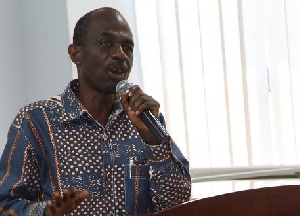The general secretary of the governing National Democratic Congress (NDC), Johnson Asiedu Nketia, has said pro-poor interventions initiated by the New Patriotic Party (NPP) in the Kufuor administration did not trickle down to the targeted beneficiaries due to the party’s capitalist ideology, which, according to him, does not seek the welfare of the masses.
He said the NPP’s botched implementation of social support programmes such as the National Health Insurance Scheme (NHIS) and the National School Feeding Programme (NSFP), which he claimed the NDC had conceptualised, gave the opposition party away as one which did not have the lower stratum of society at heart.
Mr Asiedu Nketia, known in political circles as General Mosquito, said these in an interview on Accra100.5FM’s morning show, Ghana Yensom, on Wednesday April 13, 2016.
The NDC prides itself as a social democratic party, a contrast to the NPP’s capitalist, property-owning leanings, for which reason the NDC General Secretary believes social programmes cannot be the NPP’s forte.
“Because it [social intervention] is not their core belief, they implement it in a capitalist way. It is done in the name of the people, but it is not the people who benefit. So, if you look at the social intervention policies they introduced, it turned out to benefit them, not the poor in whose name they implemented it,” General Mosquito told Chief Jerry Forson, host of the show.
“So, if you look at the way the NDC implements social interventions, we target the real beneficiaries. That is the difference between [us and] the NPP, who pretend to be implementing social interventions; even in the implementation, they do it in a capitalist way.”
He cited the National School Feeding Programme (NSFP) as an instance.
He said though the idea was to help the “vulnerable”, who could not send their children to school because they could not afford food for them, the NPP rather saw it as a “small business”, which they concentrated in the urban rather than the rural areas to cut cost and maximise their ill-got profit.
“But even in the urban centres where the school feeding was concentrated, no school at Nima and Chorkor [two of Accra’s slums] was included. In the downtrodden areas, there was none. Yet, Achimota School was being fed,” the former Wenchi West MP revealed.
“Ask yourself that how many parents with children at Achimota will agree that their children be fed in the School Feeding Programme. In Kumasi, at Asawase and areas where the people are predominantly poor, the programme was focused on Adum and [other] rich places.
According to Mr Asiedu Nketia, the NDC has undertaken some reforms of the programme, which has seen 1.7 million mouths being fed daily, up from 400, 000 during the Kufuor era. He said one part of the transformation of the NSFP had been the retargeting of beneficiaries, saying that in the Ashanti Region, alone, the move had seen many schools in the metropolis struck off the register and more than 50,000 pupils in the rural parts of the region covered.
Another improvement, he said, has been the use of fresh funds for the programme to cover the feeding of more pupils in the poorest regions of the country – Northern, Upper East, Upper West, and Central – as well as making a decision not to increase the quota for “heavily subscribed” regions, such as Ashanti and Greater Accra.
General News of Wednesday, 13 April 2016
Source: classfmonline.com













